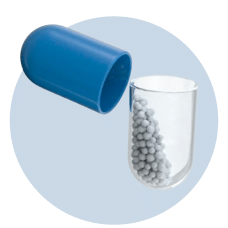CV-Acs 90 Tablet
परिचय
CV-Acs 90 Tablet is also used to treat people with a recent heart attack or severe heart-related chest pain (unstable angina) who have undergone stenting of the heart. यह ऐसे लोगों को गंभीर हृदय संबंधी समस्याओं जैसे कि हार्ट अटैक, स्ट्रोक या स्टंट्स में खून के थक्के बनने से बचाने में मदद करता है.
आपका डॉक्टर इस दवा के साथ एस्प्रिन, एक अन्य एंटीप्लेटलेट दवा भी निर्धारित करेगा. CV-Acs 90 Tablet may be taken with or without food and should be taken regularly at the same time each day. अगर आप बेहतर महसूस करते हैं, तो भी इसे लेते रहना आवश्यक है. अगर आप इस दवा का सेवन बंद कर देते हैं, तो यह आपको किसी अन्य हार्ट अटैक या स्ट्रोक होने की संभावना को बढ़ा सकता है.
The most common side effects of this medicine are dyspnea (breathlessness) and bleeding. If you cut or injure yourself, it may take longer than usual for the bleeding to stop. Such episodes of bleeding are usually mild and resolve on their own. Mild breathlessness caused by this medicine usually resolves on its own with continued treatment. अगर खून निकलना (ब्लीडिंग) बना रहता है या सांस फूलना और खराब हो जाता है या ठीक नहीं होता है तो अपने डॉक्टर को बताएं.
CV-Acs 90 Tablet is not suitable for some people. Do not take it if you are bleeding from anywhere in the body, such as a stomach ulcer or bleeding within the brain. यह लिवर संबंधी बीमारी वाले लोगों को न लेने की सलाह दी जाती है. Before using the medicine, inform your doctor of any such problems.
Uses of CV-Acs Tablet
- हार्ट अटैक
- हार्ट अटैक और स्ट्रोक से बचाव
- अनियंत्रित एंजाइना
Benefits of CV-Acs Tablet
हार्ट अटैक और स्ट्रोक से बचाव
Side effects of CV-Acs Tablet
Common side effects of CV-Acs
- खून निकलना (ब्लीडिंग)
- सांस फूलना
How to use CV-Acs Tablet
How CV-Acs Tablet works
सुरक्षा संबंधी सलाह
Dizziness, confusion, vertigo, and syncope have been reported in some patients. If you experience such symptoms, be cautious while driving or using machines.
Limited information is available on the use of CV-Acs 90 Tablet in renal dialysis patients.
Use of CV-Acs 90 Tablet is not recommended in patients with severe liver disease.
What if you forget to take CV-Acs Tablet
सभी विकल्प
ख़ास टिप्स
- सबसे बेहतर नतीजों के लिए, हर दिन इसे एक ही समय पर लें.
- CV-Acs 90 Tablet increases your risk of bleeding. शेविंग करते समय, धारदार वस्तुओं का इस्तेमाल करते समय या हाथों और पैरों के नाखून काटते समय सावधानी रखें.
- Do not discontinue using the medicine without consulting your doctor, as this may increase your chances of having another heart attack or stroke.
- If you are scheduled to undergo surgery or dental treatment, you may be asked to temporarily stop taking CV-Acs 90 Tablet.
- इलाज के शुरुआती सप्ताह में आपको सांस की कमी का अनुभव हो सकता है. अगर यह और अधिक बिगड़ जाता है या लंबे समय तक रहता है तो अपने डॉक्टर को सूचित करें.
फैक्ट बॉक्स
अक्सर पूछे जाने वाले प्रश्न
Is CV-Acs 90 Tablet an anticoagulant
Can I drink alcohol with CV-Acs 90 Tablet
What is the most important thing I should know about CV-Acs 90 Tablet
What will happen if I stop taking CV-Acs 90 Tablet
Should I stop taking CV-Acs 90 Tablet before having surgery or dental treatment
How long does CV-Acs 90 Tablet take to work
Disclaimer:
टाटा 1mg's का एकमात्र उद्देश्य यह सुनिश्चित करना है कि उसके उपभोक्ताओं को एक्सपर्ट द्वारा जांच की गई, सटीक और भरोसेमंद जानकारी मिले. हालांकि, यहां निहित जानकारी का उपयोग एक योग्य चिकित्सक की सलाह के लिए विकल्प के रूप में नहीं किया जाना चाहिए. यहां दिए गए विवरण सिर्फ़ आपकी जानकारी के लिए हैं. यह संभव है कि इसमें स्वास्थ्य संबधी किसी विशेष समस्या, लैब टेस्ट, दवाओं और उनके सभी संभावित दुष्प्रभावों, पारस्परिक प्रभाव और उनसे जुड़ी सावधानियां एवं चेतावनियों के बारे में सारी जानकारी सम्मिलित ना हो। किसी भी दवा या बीमारी से जुड़े अपने सभी सवालों के लिए डॉक्टर से संपर्क करें. हमारा उद्देश्य डॉक्टर और मरीज के बीच के संबंध को मजबूत बनाना है, उसका विकल्प बनना नहीं.रिफरेंस
- Weitz JI. Blood Coagulation and Anticoagulant, Fibrinolytic, and Antiplatelet Drugs. In: Brunton LL, Chabner BA, Knollmann BC, editors. Goodman & Gilman’s: The Pharmacological Basis of Therapeutics. 12th ed. New York, New York: McGraw-Hill Medical; 2011. pp. 871-72.
- Fox KA, White HD, Gersh BJ, et al. Antithrombotic Agents: Platelete Inhibitors, Acute Anticoagulants, Fibrinolytics, and Chronic Anticoagulants. In: Opie LH, Gersh BJ, editors. Drugs for the Heart. 8th ed. Philadelphia, Pennsylvania: Elsevier Saunders; 2013. pp. 351-52.
- Briggs GG, Freeman RK, editors. A Reference Guide to Fetal and Neonatal Risk: Drugs in Pregnancy and Lactation. 10th ed. Philadelphia, PA: Wolters Kluwer Health; 2015. pp. 1359-60.
मार्केटर की जानकारी
The list of available options shown with the same composition has been prepared upon the advice of registered medical practitioners, pharmacists affiliated with TATA 1MG. TATA 1MG does not promote any pharmaceutical product of any particular company, and all recommendations are based on the medical opinion, advisories from specialist medical and pharmaceutical professionals.
हमारे पास उपलब्ध टेस्ट













